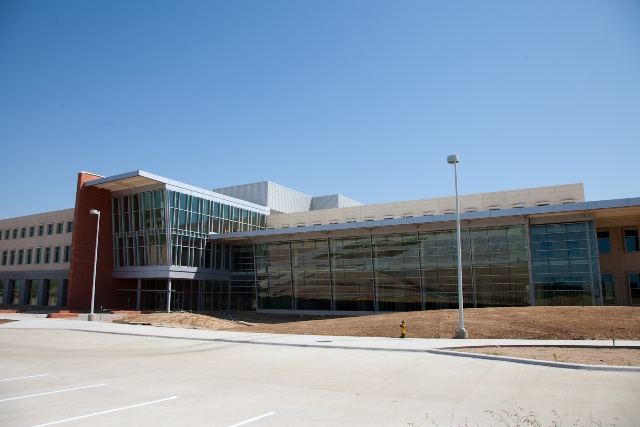Baylor University Appoints Director for Innovative Business Accelerator

The IBA will be housed in the Baylor Research and Innovation Collaborative. Photo courtesy of Baylor Photography
Follow us on Twitter: @BaylorUMedia
Media contact: Frank Raczkiewicz , (254) 710-1964

WACO, Texas (Sept. 17, 2012) - Gregory Leman, Ph.D., has been named director of Baylor University's Innovative Business Accelerator (IBA), which helps new technology companies grow their business more rapidly by taking advantage of the University's research and academic intellectual capital.
The IBA is a joint venture of the Baylor Hankamer School of Business and the Office of the Vice Provost for Research. It will be housed in the Baylor Research and Innovation Collaborative (BRIC), scheduled to open in January 2013.
Leman, who has held the position of clinical professor, Director of University Entrepreneurial Initiatives, and the Curtis Hankamer Chair in Entrepreneurship at the Hankamer School of Business since 2005, was appointed by Terry S. Maness, D.B.A., dean of Hankamer, and Truell Hyde, Ph.D., vice provost for research.
"The IBA is built on a solid foundation of our successful collaboration with global industry," Leman said. "It will become a single point of access to University and community expertise by providing a critical link between technology companies and Baylor business, science, engineering and law faculty."
"Greg's successful business background coupled with his entrepreneurial expertise and global vision makes him the ideal person to lead the IBA," Maness said. "Through its work, the IBA will help to stimulate regional economic development."
For start-up tech companies and existing tech businesses in residence at BRIC, IBA will provide a broad range of business, science, legal and technical services to help accelerate their growth. The IBA will also launch an executive education program for executives of new technology companies.
"The IBA will provide the catalyst necessary for new ideas and businesses to flourish," Hyde said. "It will also allow leveraging of the strong economic development assets available through BRIC's funding stakeholders and our national/international business and research collaborations."
Tech companies can take advantage of Baylor University expertise and BRIC infrastructure which will include technology transfer and product discovery assistance, organizational and intellectual property strategies, staged-gate entry into commercialization programs, legal and accounting services, and international market development support through Baylor's International Entrepreneurship programs.
The IBA also facilitates access to capital for new ventures through organizations such as the Baylor Angel Network, venture capital financing and SBA loan programs.
Leman is the founding director of Baylor's Technology Entrepreneurship Initiative (TEI), which offers courses in technology entrepreneurship for engineering and business students followed by a real world consulting engagement in the U.S. or China called i5. The i5 program, which stands for "Immersion Into International Interdisciplinary Innovation", is built around a curriculum for technology ventures and is designed to create an environment for students to develop science and technology insight, business savvy and global cultural competence.
"We are already accelerating businesses," said Leman. "A key point about i5 and TEI is that the students perform live consulting assignments that client companies use in their commercialization efforts. The hands-on nature of the courses creates a foundation for our IBA offering to firms."
Leman has worked with faculty teams from across Business, Engineering, Arts & Sciences and Law schools and a Board of Advisors to develop programs and courses centered on commercializing technology.
He was a visiting assistant professor in chemical engineering at the University of Illinois from 1985 until 1988. His research interests were in the field of supercritical fluid processes. He then joined the Cabot Corporation as an engineering scientist. During his 11 years at Cabot, he was awarded two patents related to the manufacture of fumed silica. His roles spanned process research, R&D management, operations management and product line management.
From 1995 to 1998, he was managing director of Cabot-Hüls, a joint venture located in Rheinfelden, Germany. He joined Great Lakes Chemical Fluorine Division in 2000, serving first as technology director and later fluorine business director. While at Great Lakes, he led the commercialization of several new products and initiated two product platforms.
Leman received his B.S. in chemical engineering with honors from Purdue University in 1980 and earned his Ph.D. in chemical engineering at the University of Illinois in 1985.
Baylor's Office of the Vice Provost for Research supports faculty members from all academic units in their research and scholarship. It provides pre- and post-award services for grants and contracts, facilitates partnerships and collaborative agreements with external entities, manages compliance oversight and provides assistance with intellectual property and technology transfer. The office also funds and manages competitive internal grant programs to advance knowledge and help faculty more successfully compete for external research funding.
ABOUT BAYLOR UNIVERSITY
Baylor University is a private Christian university and a nationally ranked research institution, characterized as having "high research activity" by the Carnegie Foundation for the Advancement of Teaching. The university provides a vibrant campus community for approximately 15,000 students by blending interdisciplinary research with an international reputation for educational excellence and a faculty commitment to teaching and scholarship. Chartered in 1845 by the Republic of Texas through the efforts of Baptist pioneers, Baylor is the oldest continually operating university in Texas. Located in Waco, Baylor welcomes students from all 50 states and more than 80 countries to study a broad range of degrees among its 11 nationally recognized academic divisions. Baylor sponsors 19 varsity athletic teams and is a founding member of the Big 12 Conference.
ABOUT HANKAMER SCHOOL OF BUSINESS
Baylor University's Hankamer School of Business provides a rigorous academic experience, consisting of classroom and hands-on learning, guided by Christian commitment and a global perspective. Recognized nationally for several programs, including Entrepreneurship and Accounting, the school offers 24 undergraduate and 13 graduate areas of study. Visit www.baylor.edu/business and follow on Twitter at twitter.com/Baylor_Business.
ABOUT BRIC
The Baylor Research and Innovation Collaborative, (BRIC), is the first, and cornerstone, facility of the 21-acre Central Texas Technology and Research Park. When completed and fully occupied the 330,000 sq. foot building will house Baylor University research, university and industry research collaborations, technology workforce development and training, a business accelerator, space for start-up businesses, symposia meeting venues for up to 300 attendees, and K-12 science, technology, engineering and math (STEM) outreach programs. Local government and community partners for the BRIC include Baylor University, Bellmead Economic Development Corporation, City of Bellmead, City of Waco, Cooper Foundation, Greater Waco Chamber of Commerce, McLennan County, Texas State Technical College, Waco-McLennan County Economic Development Corporation and Waco Industrial Foundation. The first 45,000 square feet are scheduled to be occupied in the spring of 2013.